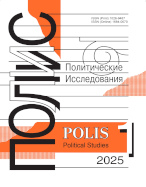World Development Policy:
Between the Reality of Globalization and the Imperative of Stability
DOI: 10.17976/jpps/2003.05.05
Veber A.B. World Development Policy: Between the Reality of Globalization and the Imperative of Stability . – Polis. Political Studies. 2003. No. 5. https://doi.org/10.17976/jpps/2003.05.05
The article presents an essay to make out how the globalization processes correlate with the stable development principle declared at the UN Conference on Environment and Development, held in 1992 in Rio de Janeiro. The author’s finding is that the policy of the leading world powers, primarily of the USA, — policy subordinated to the interests of free market — is at variance with the declared tasks of bettering the quality of life for all mankind. The purposes of stable development are, nevertheless, achievable, A.B.Veber argues, but their realization requires concentrated joint efforts to be made by governments, business, and civil society organizations. In this context, the idea of Global social contract, which was put forward by the UN and which envisages the conclusion of a relevant agreement by all contracting parties interested in the solution of world development problems, proves especially topical. Globalization processes can neither be cancelled nor stopped, but it is both necessary and possible to regulate and correct them, the author concludes.
See also:
Fyodorov K.G.,
The Policy in the Sphere of Local Taxation in Russia. – Polis. Political Studies. 2003. No4
Melville A.Yu.,
On Trajectories of Post-Communist Transformations. – Polis. Political Studies. 2004. No2
Peregudov S.P.,
Corporate Capital and Power Institutions: Who Plays the Master?. – Polis. Political Studies. 2002. No5
Kazantzev A.A.,
Intelligentsia and Structural Innovations in Political Expanse (An Essay of Comparative Analysis). – Polis. Political Studies. 2007. No1
Sergeev V.M.,
How Are Social Changes Possible? (Prolegomena to a Statistical Theory of Social Networks). – Polis. Political Studies. 2001. No6





.jpg)






 print
print
.jpg)
.jpg)